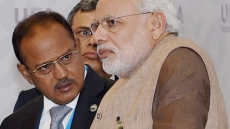Sikh passengers were dragged out of trains and killed at railway stations in Delhi during the 1984 anti-Sikh riots but the police did not arrest anyone from the spot saying that they were outnumbered, a Supreme Court appointed SIT has said in its report.
The report of the SIT, headed by retired Delhi High Court judge Justice S N Dhingra, which supervised further probe into 186 cases said that there were five cases of killings by rioters who had attacked Sikh passengers travelling on trains and on railway stations.
It said these incidents had happened on November 1 and 2, 1984, at five railway stations of Delhi—Nangloi, Kishanganj, Dayabasti, Shahdara and Tuglakabad.
“In all these five cases, police was informed about the rioters having stopped the train and attacking Sikh passengers. The Sikh passengers were dragged out of trains and were bßeaten to death and burnt. The dead bodies were found scattered on the platforms and the railway lines,” the report said.
“The police had not arrested any of the rioters from the spot. The reasons for non-arrest were shown that the police was in very small number and that the rioters, after seeing police, had ran away,” it said.
It said that perusal of files revealed that FIRs were not registered by police incident-wise or crime-wise and instead, several complaints were clubbed in one FIR. The report said that the then Deputy Commissioner of Police (DCP) had sent 337 complaints received by him soon after the riots to Sultan Puri Police station but an “omnibus” FIR was lodged in respect of all these incidents and thereafter all other complaints of killing and rioting were added in the same FIR.
It said one such FIR had complaints regarding 498 incidents and only one investigating officer was assigned to the case.
“In a few cases, FIRs were registered on the basis of a note given by a police official to SHO (station house officer) stating about a victim identifying a person as rioter and also giving the name and address of victim,” it said.
“All these cases were closed on the ground that victim did not confirm to the information. It is obvious that these cases were registered by the police to give clean chit to certain persons,” the report said.
It said that hundreds of affidavits were received by Justice Ranganath Misra Commission in respect of killing, arson, looting done by the rioters with named accused persons.
“Instead of directing registration of FIRs on the basis of these affidavits directly to the respective police stations and ordering investigation, committees after committees were formed and this further delayed registration of cases for years,” it said.
Regarding an FIR lodged at Kalyan Puri police station here, the report said police had clubbed various cases and sent a ‘challan’ (police report) in respect of murder of 56 persons but the trial court had framed charges only in respect of killing of five.
“It is not known why charges were framed only for five murders and not 56 murders and why trial court did not order separation of trial for each incident of crime,” it said.
“It is also seen from the perusal of judgements found in these files that when the witness stated in the court that she had seen the incident and can identify the culprits, the public prosecutor did not even ask her to identify the rioters out of several accused persons present in the court,” it said.
“The judge conducting the trial, having ample power under section 165 of Evidence Act to ask the questions to the witnesses, also did not bother to ask the witness as to who out the accused persons present in the court were among the rioters and had committed riots,” the report said.
The apex court had set up the SIT, also comprising retired IPS officer Rajdeep Singh and serving IPS officer Abhishek Dular, in January 2018. However, Singh had declined to be part of the team on personal grounds.
Large-scale riots targeting members of the Sikh community had broken out in the national capital in the aftermath of the assassination of the then prime minister Indira Gandhi by her two Sikh security guards on the morning of October 31, 1984. The violence had claimed 2,733 lives in Delhi alone.


